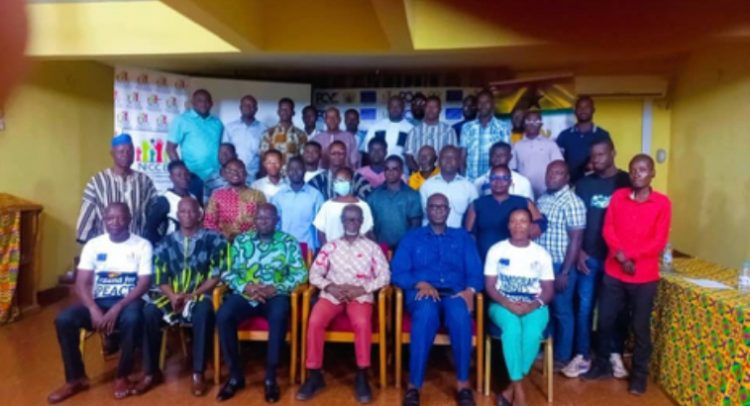Officials of NCCE with journalists
The National Commission for Civic Education (NCCE), with funding from the European Union (EU), has held a media advocacy workshop for the Preventing and Containing Violent Extremism (PCVE) project, aimed at reducing the threat of violent extremism in the country.
The two-day workshop, held in Tamale in the Northern Region, brought together journalists and media owners from the Savannah, Northern, North East, Upper East, and Upper West regions to learn and develop strategies to combat and contain violent extremism in the country through responsible media practices.
Chairperson of the National Commission for Civic Education (NCCE), Kathleen Addy, noted the importance of engaging the media in the project to prevent and contain violent extremism in the country.
She highlighted the need for journalists to operate within ethical boundaries and to possess emotional intelligence, ensuring that their reporting contributes to solutions rather than exacerbating problems.
Madam Addy noted that the media holds significant power and must avoid spreading misinformation and disinformation regarding extremism and terrorism, as these can potentially fuel violent activities.
According to her, over the past 18 months, the NCCE has conducted various engagements, including town hall meetings and interactions with young people and youth of political parties, to foster a peaceful atmosphere in the country. “The commission has also undertaken several initiatives such as film screenings and community outreach with the police,” she said.
The NCCE Chairperson encouraged journalists to verify information regarding violent extremism and terrorism before reporting.
Country Director for COGINTA-Ghana and a facilitator at the workshop,Revered Father Clement Aapengnuo, stressed the urgency of addressing the threat of violent extremism, especially in light of the upcoming critical elections, which often serve as flashpoints for extremist activities.
He urged the media to intensify their efforts to ensure peaceful elections and transitions, cautioning against allowing their reporting to be exploited by extremists.
“We must be mindful not to focus solely on external threats while neglecting the risk of domestic terrorism that could arise,” he said.
Rev. Aapengnuo outlined three pragmatic approaches for the media to adopt in preventing and containing violent extremism including conflict-sensitive reporting, reflective practice, and understanding the impact of their messages on the audience.
He reminded attendees that just over five years ago, Burkina Faso was a peaceful nation before the emergence of violent extremism, underscoring the importance of vigilance in the country.
The media advocacy programme aims to instill the skills acquired during the workshop into the value system of media personnel, promoting awareness and social inclusiveness.
FROM Eric Kombat


